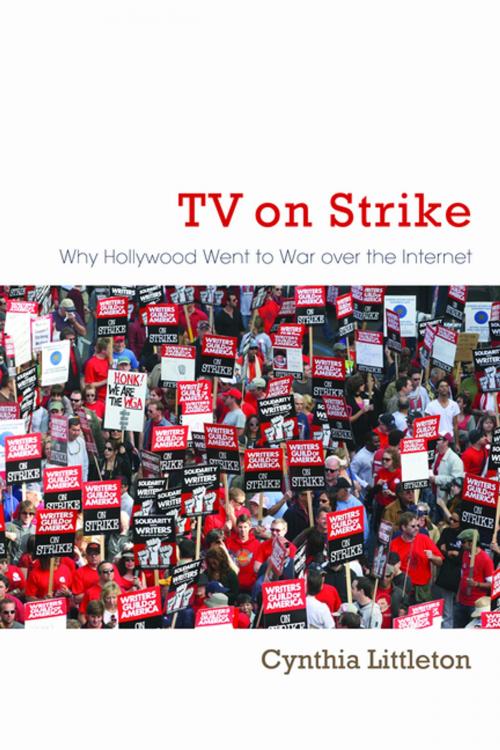TV on Strike
Why Hollywood Went To War Over the Internet
Nonfiction, Entertainment, Performing Arts, Television, History & Criticism| Author: | Cynthia Littleton | ISBN: | 9780815652007 |
| Publisher: | Syracuse University Press | Publication: | January 31, 2013 |
| Imprint: | Syracuse University Press | Language: | English |
| Author: | Cynthia Littleton |
| ISBN: | 9780815652007 |
| Publisher: | Syracuse University Press |
| Publication: | January 31, 2013 |
| Imprint: | Syracuse University Press |
| Language: | English |
On November 9, 2007, the Avenue of the Stars, a six-lane concourse that runs through the most affluent business district in Los Angeles, was swelling with striking writers and their supporters. It was day five of the Writers Guild of America strike against film and television production entities, notably those controlled by Hollywood’s heavyweights: Walt Disney Co., News Corp., Time Warner, NBC Universal, Viacom, Sony Corp., and CBS Corp. Nearly two years of rhetoric and posturing by leaders of the guild and the major entertainment conglomerates had devolved into a bare-knuckle street fight. It was the first industry-wide walkout to hobble Hollywood in nearly twenty years. In TV on Strike Littleton narrates the inside story of the hundred-day writers’ strike that crippled Hollywood, exploring the television industry's uneasy transition to the digital age that was the driving force behind the most significant labor dispute of the twenty-first century. The strike put the spotlight on how the advent of new media distribution platforms is reshaping the traditional business models that have governed the entertainment business for decades. The more than 4,000 writers that crowded the streets of Los Angeles and New York with picket signs laid bare the depth of the divide, after years of industry consolidation, between the handful of media barons who rule Hollywood and the writers whose works support the industry. With both sides afraid of losing millions in future profits, a critical communication breakdown spurred a brief but fierce fight with repercussions that continue today. The saga of the Writers Guild of America strike is told through the eyes of key players on both sides of the negotiating table and by the foot soldiers who shocked even themselves with the strength of their resolve to fight for their rights in the face of an ambiguous future.
On November 9, 2007, the Avenue of the Stars, a six-lane concourse that runs through the most affluent business district in Los Angeles, was swelling with striking writers and their supporters. It was day five of the Writers Guild of America strike against film and television production entities, notably those controlled by Hollywood’s heavyweights: Walt Disney Co., News Corp., Time Warner, NBC Universal, Viacom, Sony Corp., and CBS Corp. Nearly two years of rhetoric and posturing by leaders of the guild and the major entertainment conglomerates had devolved into a bare-knuckle street fight. It was the first industry-wide walkout to hobble Hollywood in nearly twenty years. In TV on Strike Littleton narrates the inside story of the hundred-day writers’ strike that crippled Hollywood, exploring the television industry's uneasy transition to the digital age that was the driving force behind the most significant labor dispute of the twenty-first century. The strike put the spotlight on how the advent of new media distribution platforms is reshaping the traditional business models that have governed the entertainment business for decades. The more than 4,000 writers that crowded the streets of Los Angeles and New York with picket signs laid bare the depth of the divide, after years of industry consolidation, between the handful of media barons who rule Hollywood and the writers whose works support the industry. With both sides afraid of losing millions in future profits, a critical communication breakdown spurred a brief but fierce fight with repercussions that continue today. The saga of the Writers Guild of America strike is told through the eyes of key players on both sides of the negotiating table and by the foot soldiers who shocked even themselves with the strength of their resolve to fight for their rights in the face of an ambiguous future.















